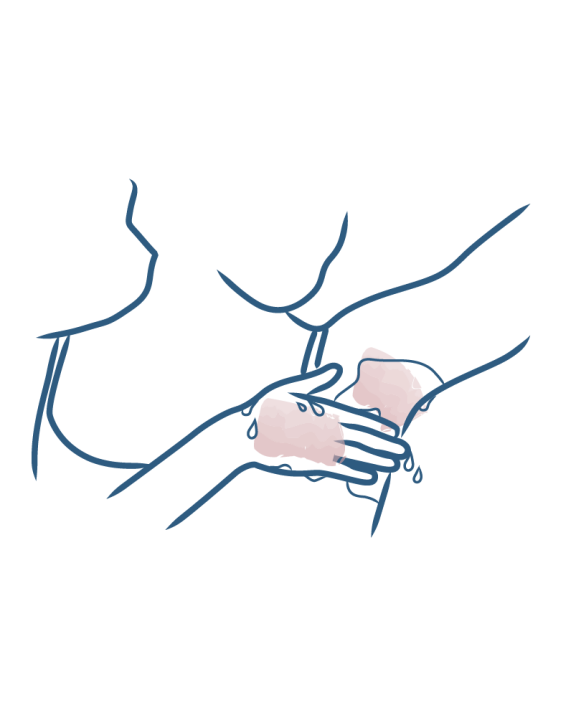How to avoid excessive everyday perspiration?
- How to treat hyperhidrosis?
- Botulinum toxin injections for preventing hyperhidrosis
- Antiperspirant active ingredients for preventing hyperhidrosis
- Iontophoresis for preventing excessive perspiration
- Managing stress and emotions
- Surgery for preventing hyperhidrosis
- Aluminium salts
- Anticholinergic medication for preventing hyperhidrosis

How to avoid excessive everyday perspiration?
Excessive perspiration, also known as hyperhidrosis, is when more sweat is produced than required to thermoregulate the body. Oversweating can be particularly incapacitating. It can be localized or affect the whole body.
The causes cannot always be identified
Hyperhidrosis affects between 0.6 and 2.8%(1) of the population. There are two types of excessive perspiration:
- Primary hyperhidrosis, which is hyperhidrosis not caused by a health problem and which begins at an early age or in adolescence.
- Secondary hyperhidrosis, induced by an illness or use of certain medicinal treatments. If excessive perspiration appears suddenly in adulthood, it’s important to consult a doctor because it may be due to a disease, such as diabetes.
Factors contributing to excessive perspiration
The causes cannot always be identified, but there are many factors that can trigger oversweating. Stress, hormonal changes, eating certain foods, in particular spicy foods, and certain diseases can all bring on oversweating. Taking measures to control these triggers, when possible, will reduce excessive perspiration. If you don’t notice any improvement, don’t hesitate to consult your doctor.
Impaired quality of life
It is not uncommon for people with hyperhidrosis to avoid shaking hands, or taking part in certain sports for fear of sweating too much. They may not dare to wear the clothing they would like, or to wear light-coloured clothes, and they will need to change or freshen up several times a day. Hyperhidrosis can therefore have a significant impact on quality of life.
However, treatments do exist for limiting the phenomenon of oversweating, so talk to your doctor, they can advise you on appropriate treatment.
Social embarrassment
Some people take a dim view of hyperhidrosis and associate it, incorrectly, with poor hygiene. It can therefore become difficult to live with when people stare. Hyperhidrosis at work or in social relationships can have a very strong impact on quality of life.
People with hyperhidrosis find it difficult to talk about and are often poorly understood, which makes the excessive perspiration hard to cope with and can result in loss of confidence and self-esteem and in reduced social contact.
Prevention
In addition to treatments, there are things you can do that will help reduce hyperhidrosis if done daily:
- Adopt a daily cleansing routine
- Dry skin thoroughly after bathing or showering to avoid proliferation of bacteria or fungi, which increases in a damp environment
- Drink enough water to compensate for loss through excessive perspiration and to avoid dehydration
- Change socks every day in case of sweaty feet, and give shoes time to dry before putting them back on (it’s therefore best not to wear the same pair two days in a row)
- Choose the right clothes, i.e. natural fibres such as cotton, wool or silk which allow skin to breathe, and avoid synthetic materials
- Always have a change of clothing on hand to avoid stressful situations that could further increase sweat secretion
- Keep something to hand on which you can dry your hands if necessary
(1) Stolman LP. Treatment of hyperhidrosis. Dermatol Clin 1998;16:863-9
Our care routines
Excessive perspiration

